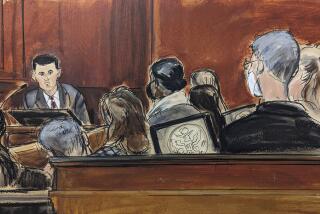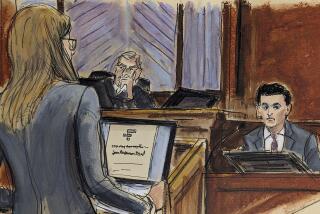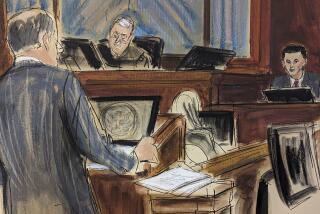Defense Rests in Sotheby’s Price-Fixing Trial; Ex-Chairman Doesn’t Testify
- Share via
NEW YORK — Attorneys for A. Alfred Taubman rested their case at his federal price-fixing trial here Thursday without calling the former Sotheby’s chairman as a witness in his own defense.
Instead, the defense relied on the testimony of present and former officials of the auction house to describe the 76-year-old Taubman as a man more interested in the guest list of parties than the financial details of his business, and a man who sometimes dozed at board meetings.
Presenting its case in less than five days, the defense also tried to undercut the credibility of the prosecution’s star witness, former Sotheby’s chief executive Diana D. “Dede” Brooks, who testified earlier that she was acting at Taubman’s direction when she colluded with rival Christie’s to raise the commissions charged sellers of art in 1995.
Taubman “was virtually silent ... he was not involved in the financial aspects,” Sotheby’s chief financial officer William Sheridan told the U.S. District Court jury Thursday.
“Mr. Taubman was more concerned with what time lunch would be served and what was for lunch.”
He described Brooks, in contrast, as a brusque, dominating CEO who wanted to do things “on her own” and sometimes got frustrated with Taubman, telling him, “Alfred, you don’t understand the business.”
Sheridan testified that Brooks also balked at company regulations requiring her to get approval from a second executive before granting large cash advances, or loans, to the firm’s elite customers. He said that when they once traveled to London to get the OK of a 94-year-old board member, Max Fisher, to make an “extremely large” loan--for $250 million--Brooks griped, “I hate getting approval from these old men who always fall asleep at meetings.”
Another time, Sheridan testified, Brooks got no second approval for a $105-million loan to a “new collector” from a well-known family before auctions in May 1999, only to have the man default on making payments.
During cross-examination, Justice Department antitrust prosecutor John Greene tried to establish that the credit line was reasonable because the unnamed art buyer was a “very wealthy individual.”
“It turned out he was not that wealthy,” the defense witness responded.
U.S. District Judge George B. Daniels gave the jury today off, and scheduled closing arguments for Monday. The jury is expected to begin deliberations Tuesday.
Taubman, who resigned as Sotheby’s chairman but still is its largest shareholder, faces up to three years in prison if convicted.
The government based its case in part on Taubman’s own date books, showing a series of private meetings with the chairman of Christie’s in 1993. The prosecution also obtained the testimony of both Brooks and the chief executive of Christie’s that they were following orders from their higher-ups when they agreed to stop offering discounts to top art collectors, who would play one auction house against the other.
Attorneys for Taubman, in turn, are counting on jurors being suspicious of Brooks, in particular, who pleaded guilty last year to a single conspiracy count and testified in hopes of avoiding prison when she is sentenced. Prosecutors promised to request leniency in return for her cooperation.
The two sides have contested points large and small, down to who was the target of a quip by Taubman when a federal investigation was closing in on Sotheby’s in early 1990.
During the prosecution’s case, Brooks testified that Taubman showed her a newspaper photo of her and said, “You’ll look good in stripes”--prison garb--as if hoping to intimidate her not to cooperate with authorities.
But the defense had the firm’s in-house attorney testify this week that Taubman directed the black humor at himself, saying, “How’d you think I’d look in stripes?”
More to Read
Inside the business of entertainment
The Wide Shot brings you news, analysis and insights on everything from streaming wars to production — and what it all means for the future.
You may occasionally receive promotional content from the Los Angeles Times.










